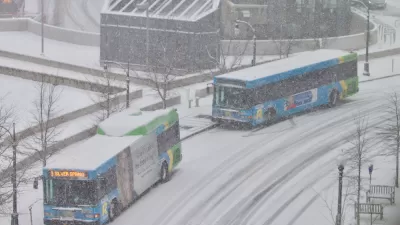In Washington D.C., Michael Perkins explains that starting next July, Metro would be at a deficit of $120 million. They have come up with several ideas to raise a portion of that money through fares.
There are several ideas that Metro has proposed that include adjusting bus fares, raising rail fares, and raising parking fees to make up some of the amount that will be lost next year.
Perkins says that, "the first idea would be to adjust Smartrip bus fares according to general inflation for the past two years, and increase cash bus fares to make them even dollars. The new Smartrip bus fare would be $1.60, and the new regular, express and airport fares would be $2, $4 and $6."
For the rail fares, they plan to make increases where peak fares increase by the rate of inflation, which would be about 10 cents for the base fare and increases in the distance-based fares. Perkins mentions that "another option for adjusting rail fares would be to increase only the off-peak fares. In this option, the off-peak fare would increase to 90% of the peak rail fare, and the peak fares would be kept the same. "
Other ideas include a $0.25 increase across the board for all parking, and a new two-zone fare-card system that will require riders to pay $3 for trips within a central zone and all other trips would be $6.
FULL STORY: Fare hikes probable to cover part of Metro's $120 million gap

Planetizen Federal Action Tracker
A weekly monitor of how Trump’s orders and actions are impacting planners and planning in America.

Map: Where Senate Republicans Want to Sell Your Public Lands
For public land advocates, the Senate Republicans’ proposal to sell millions of acres of public land in the West is “the biggest fight of their careers.”

Restaurant Patios Were a Pandemic Win — Why Were They so Hard to Keep?
Social distancing requirements and changes in travel patterns prompted cities to pilot new uses for street and sidewalk space. Then it got complicated.

Platform Pilsner: Vancouver Transit Agency Releases... a Beer?
TransLink will receive a portion of every sale of the four-pack.

Toronto Weighs Cheaper Transit, Parking Hikes for Major Events
Special event rates would take effect during large festivals, sports games and concerts to ‘discourage driving, manage congestion and free up space for transit.”

Berlin to Consider Car-Free Zone Larger Than Manhattan
The area bound by the 22-mile Ringbahn would still allow 12 uses of a private automobile per year per person, and several other exemptions.
Urban Design for Planners 1: Software Tools
This six-course series explores essential urban design concepts using open source software and equips planners with the tools they need to participate fully in the urban design process.
Planning for Universal Design
Learn the tools for implementing Universal Design in planning regulations.
Heyer Gruel & Associates PA
JM Goldson LLC
Custer County Colorado
City of Camden Redevelopment Agency
City of Astoria
Transportation Research & Education Center (TREC) at Portland State University
Camden Redevelopment Agency
City of Claremont
Municipality of Princeton (NJ)





























